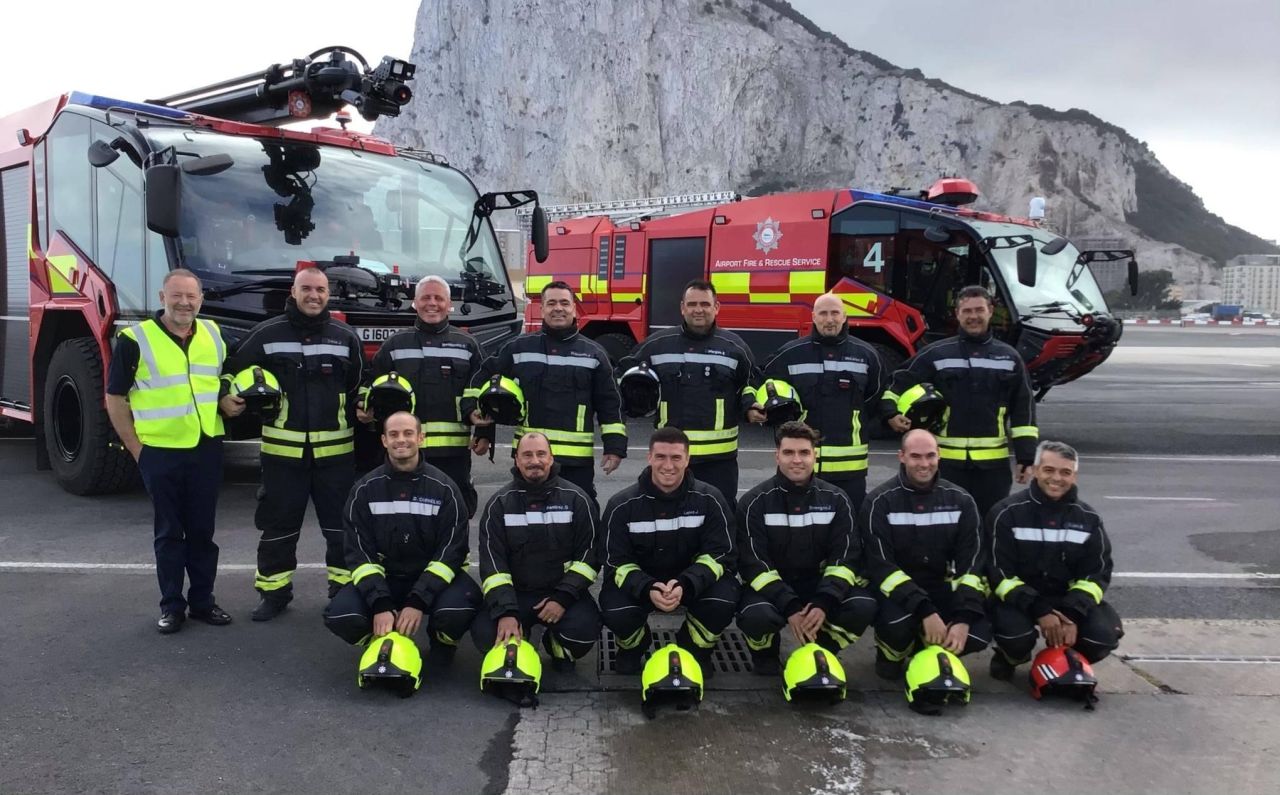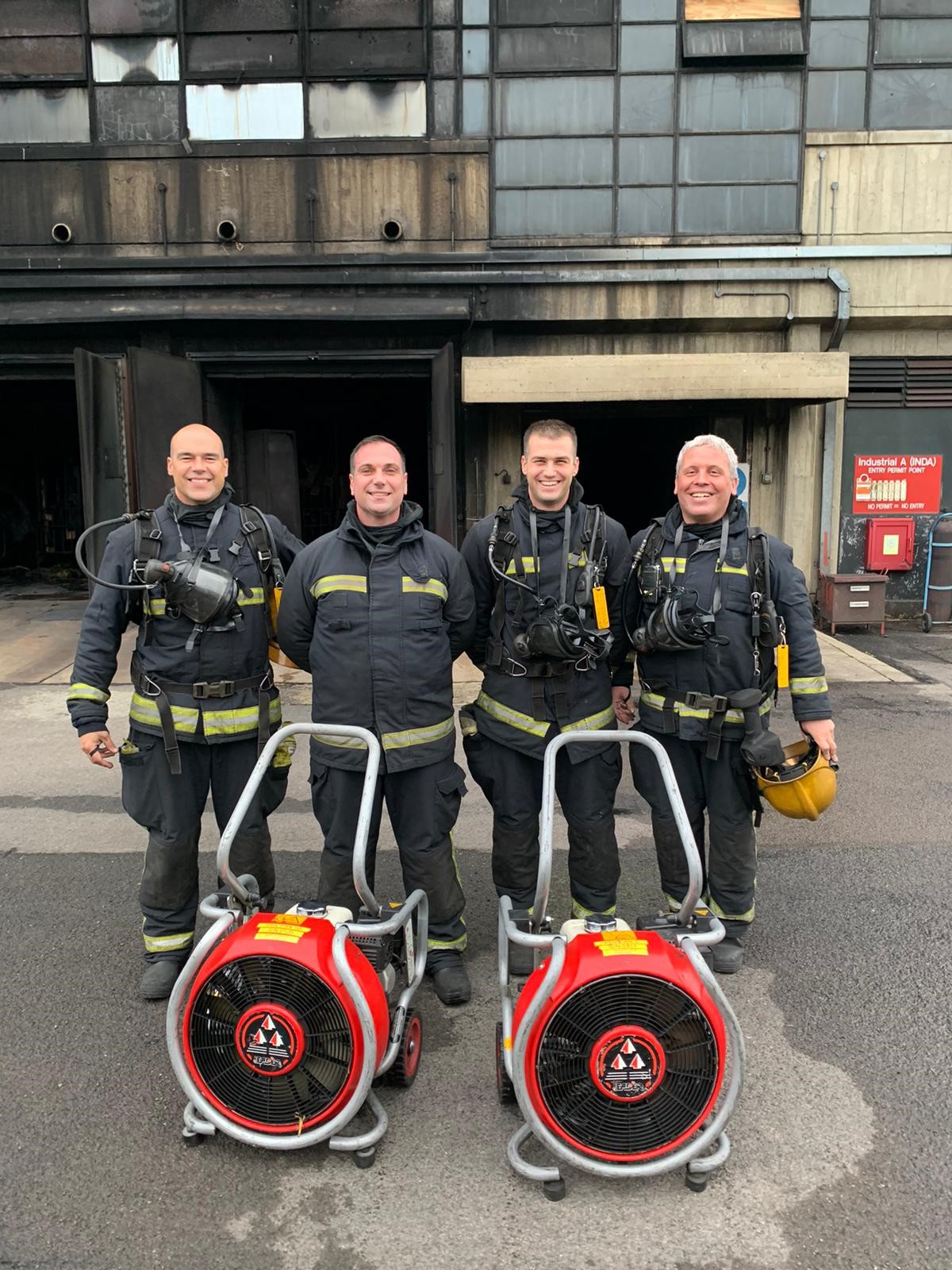Busy October Training For AFRS

During the past month the Airport Fire and Rescue Service (AFRS) personnel have been engaging in an extremely busy training and instruction period involving numerous facets of their operational roles;
INCIDENT COMMAND LEVEL 2 COURSE: Early in October three of its personnel successfully completed an Incident Command Level 2 course at the Fire Service College (FSC) in Moreton-In- Marsh, Gloucestershire, UK. Sub Officer Karim Afzan and Leading Firefighters Jarvis Davis and Tyronne Avellano attended a week-long course at the FSC where they undertook Incident Command work elements which encompassed both theoretical instruction and the use of virtual reality software. The course instruction was also interlinked with considerations of human factors and the unpredictable behavioural elements of people who might get caught up in incident scenarios.
This Skills for Justice Award in Incident Command (ICL 2) accredited course presented the individuals with a large variety of realistic and complex incident scenario simulations, the intensity of which prepared them well towards achieving good overall results in their final assessments.
Beyond learning from the course content itself, the opportunity to work alongside more experienced colleagues from numerous UK Fire and Rescue Services, with vital first-hand knowledge has also proved to be invaluable. The understanding gained will serve to further develop them in both their current and future roles in critical decision making skills necessary for operational commanders.
REVALIDATION TRAINING: Also during October, the whole of AFRS firefighting complement undertook a practical firefighting and rescue operations, including incident command revalidation programme. This critical element had been considerably delayed due to COVID-19. Only until now was Mr John Lord, a very experienced and highly regarded instructor from SimTrainer UK Ltd, able to travel to Gibraltar for this purpose, a practical element which is an auditable requirement for Aviation Compliance.
The revalidation exercises included assessable responses to a wide variety of scenarios where Incident Commanders at different levels were put through their paces throughout a whole week and their performances subsequently evaluated. The overall operational response, plan of action and its execution were scrutinised with considerable knowledge gained from this process which has enabled crews to further improve the execution of their tasks. All of the AFRS firefighting personnel were involved throughout the week and it was deemed to have been a most valuable experience, one which has to be undertaken every 4 years.
TASK RESOURCE ANALYSIS: Just a week prior to the revalidation training the AFRS also underwent an overview audit inspection and a series of Task Resource Analysis (TRA) sessions under the auspices of the Defence Fire Safety Regulator. The both theoretical and practical TRA sessions consisted of being able to confirm that the AFRS was meeting its mandated incident response requirements in a series of simulated worst case scenarios, with sufficient personnel and firefighting resources, and in this respect it was given a clean bill of health for its operational effectiveness.
TACTICAL VENTILATION COURSE: Later that same month Leading Firefighters Jamie Linares and Shane MacDonald attended a Tactical Ventilation Course at the FSC, accredited by Skills for Justice, together with colleagues Sub Officer Jared Olivero and Leading Firefighter Martin Posso from the Gibraltar Fire and Rescue Service. This again entailed theoretical instruction and practical exercising of alternative techniques for ventilating compartments, both during and post fire incidents to better understand the elements involved and maximize the effectiveness of response.
The aim is ultimately to limit fire spread and minimize damage using a variety of techniques such as mechanical, forced positive pressure as well as natural ventilation techniques. In addition, the course included specific considerations for high rise building fires as well as instructing on the ventilation considerations for firefighters, such as mechanically pressurizing stairwells to create viable escape routes to facilitate evacuation.
RECRUIT FIREFIGHTER: At the end of October AFRS new recruit Firefighter Craig Bonnici completed his initial Structural Firefighter course at the FSC. Following 8 weeks of intense and very demanding training in all aspects of structural fires, road traffic incidents and breathing apparatus search and rescue procedures, he is now a qualified firefighter. He will however very shortly be attending the necessary aviation specific training in the International Fire Training Centre in Teesside. On successfully undertaking that course he will then become operational at the AFRS at beginning of December with a further continual development process then commenced locally.
Minister Samantha Sacramento, with responsibility for the Fire and Rescue Services, also added; ‘This ongoing programme of continual professional development at both organisational and at individual self-improvement levels demonstrates that the AFRS is well placed to meet any challenges that may be placed on it. Although excellent results were obtained when reviewed and validated by accredited external training providers and regulating bodies, this nevertheless serves the organisation with an ability to learn from all these processes, addressing any lessons identified to review and refine policies and procedures, wherever it might be needed. Although mandated by Aviation Regulatory bodies, undergoing this laborious training and compliance led organisational scrutiny serves the AFRS well to deliver an even safer and far more effective level of operational service delivery.’

Latest News
- Unite’s Reaction to the Chief Minister’s Budget Address “Mainly Positive”
- Statement on Section 66 Proceedings Regarding Victoria Stadium Tenancy
- Temporary Closure of Small Pools at Camp Bay and Little Bay Due to Vandalism
- The Budget 2025 – Chief Minister’s Address
- Applications For Appointment As King's Counsel 2025
- End The Disparity Between High-Cost GHA Contracts And Local Wage Stagnation Says Together Gibraltar
- Minister Cortes Attends St Mary’s University 175th Anniversary Service
- Ministry Of Equality’s Pride Conference A Resounding Success
- Government Conducts Emergency Response Exercise At Bleak House
- New Gibraltar-Based AI Marketing platform Zaturn Offers Free Trials



